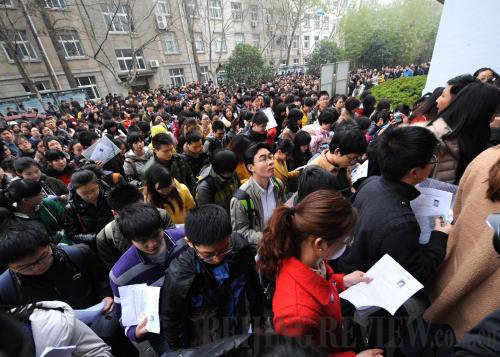|
 |
|
CIVIL SCRAMBLE: Applicants for this year's civil service exam in Jiangsu Province shuffle into an examination hall in Nanjing Forestry University on March 24 (SUN CAN) |
The "iron rice bowl" of guaranteed job security and enviable benefits for Chinese public sector employees is showing cracks.
Since the beginning of this year, local governments across Hunan Province have been using webcams and tiny "pinhole" cameras to secretly record government officials. Some were caught sleeping, playing games, and watching online videos during work hours.
One caught a government official in Chenzhou viewing a pornographic webpage during office hours. The candid clip appeared in a China Central Television news broadcast, and led to him being removed from his post.
While Hunan's efforts to weed out laziness in government offices have been praised by the public as a strong deterrent, their astonishing misbehavior also enraged some netizens, who have been calling for more permanent forms of supervision to keep officials from wasting time and taxpayers' money.
Long-awaited reform
For years, people in China have been demanding more effective monitoring and evaluation of bureaucrats and reforms on their employment system to keep them better motivated.
For a long time after 1949, large numbers of urban employees in China relied upon public finance for salaries, be they government officials or employees of state-owned enterprises.
A dividing line was drawn in the late 1980s when labor contracts were adopted to facilitate the reform of state-owned enterprises. "Breaking iron bowls" was hailed as a landmark move to end "egalitarianism" and encourage competition in the job market.
The reform later spread to public institutions affiliated to governmental departments in the 1990s when permanent employment was replaced by labor contracts.
However, administrative agencies have been untouched by the reform and remain as places where employees are guaranteed to work till their retirement age as long as they are not removed for missteps.
Meanwhile, civil servants are found in a well-defined ranking system. The rank of a civil servant determines which positions he or she may assume in the government, how much political power he or she gets, and the level of benefits in transportation and healthcare.
To optimize the current civil service management system, in recent years many Chinese cities, including Beijing and Shanghai, have launched pilot programs of employing civil servants on contract.
On June 2, Beijing launched a nationwide recruitment campaign for six senior executive positions in three municipal government agencies, offering an annual salary of no less than 200,000 yuan ($32,600) to each. However, those positions are not government jobs for life, as the two- or three-year-long contracts not only have probationary periods varying from three to six months, but also can be terminated should the person fail a performance evaluation.
According to China's Civil Service Law that took effect in 2006, contract-based employment should be applied to two kinds of posts: those requiring professional expertise and those providing general services.
Unlike the annual civil service exams at national and local levels where most vacancies require applicants to be recent college graduates, under most pilot programs, government posts with high requirements on candidates' expertise in certain fields are publicized to attract experienced professionals.
Zhangzhou is the first city in southeast China's Fujian Province to conduct such a pilot program. Last May, the city hired an urban planning professional and petrochemical engineer on three-year contracts for its Gulei Economic Development Zone. The job description of the petrochemical engineer required him or her to take part in designing the layout of a petrochemical industrial park.
The two contracted government employees are paid 6,000 yuan ($978) a month, which is considerably higher than salaries of their colleagues. However, they are under harsher evaluation standards as the contracts mandate that they would be fired if they do not pass appraisals.
| 